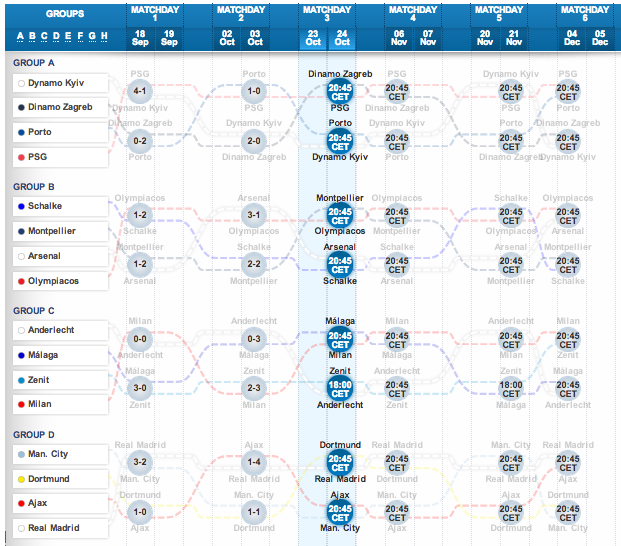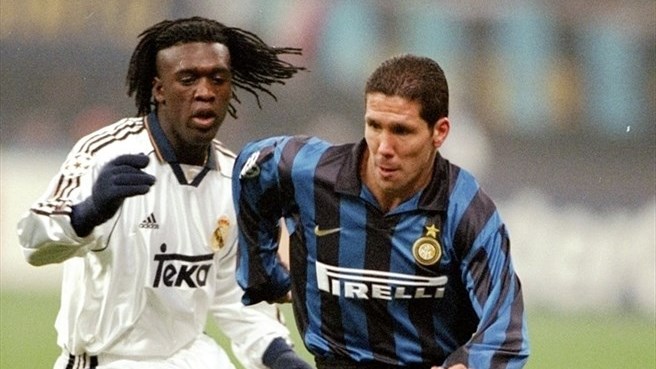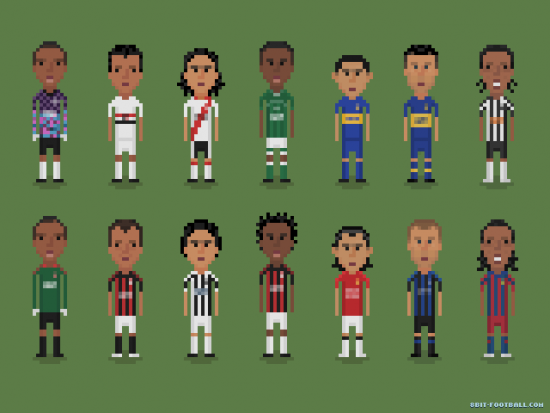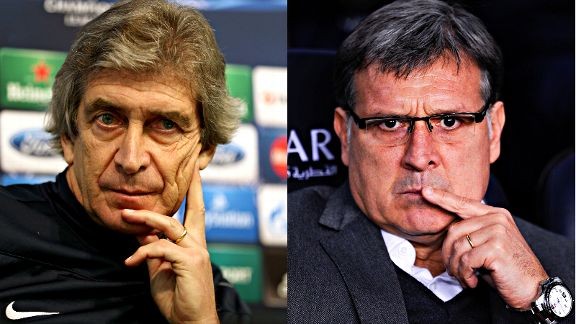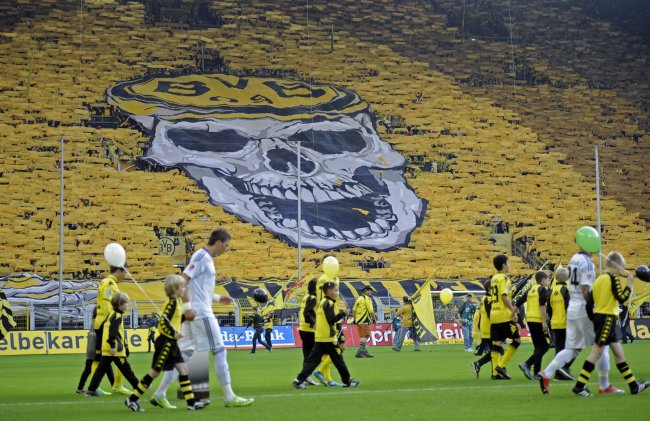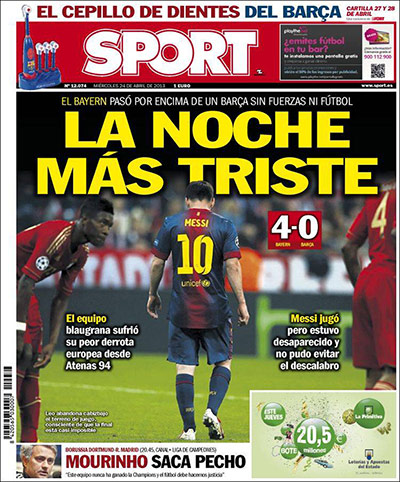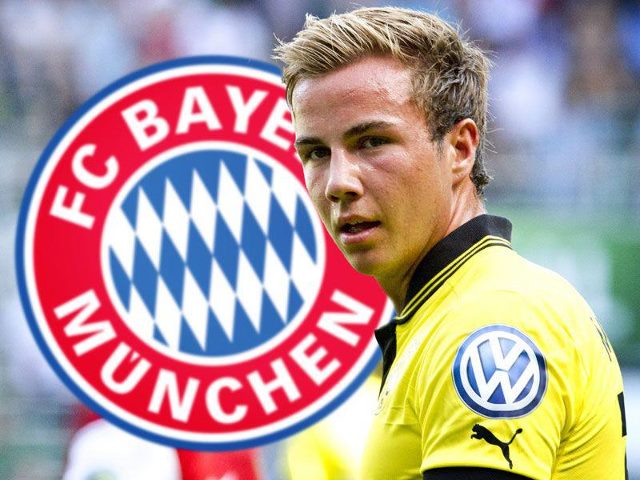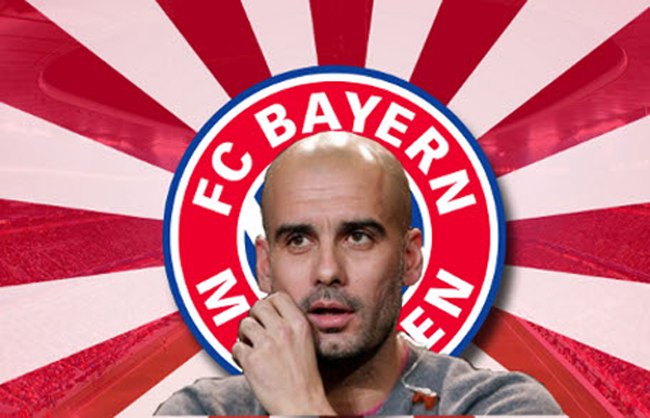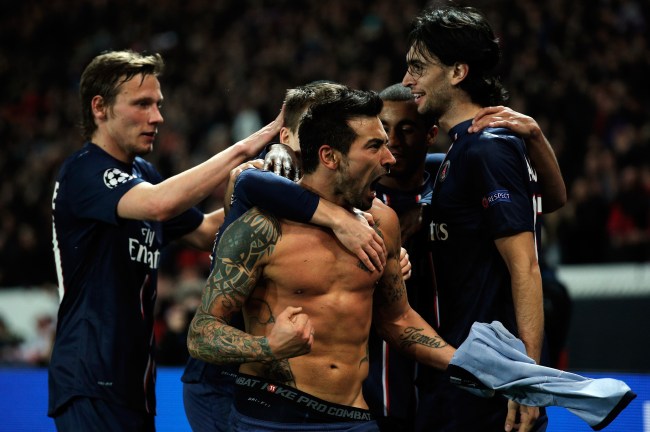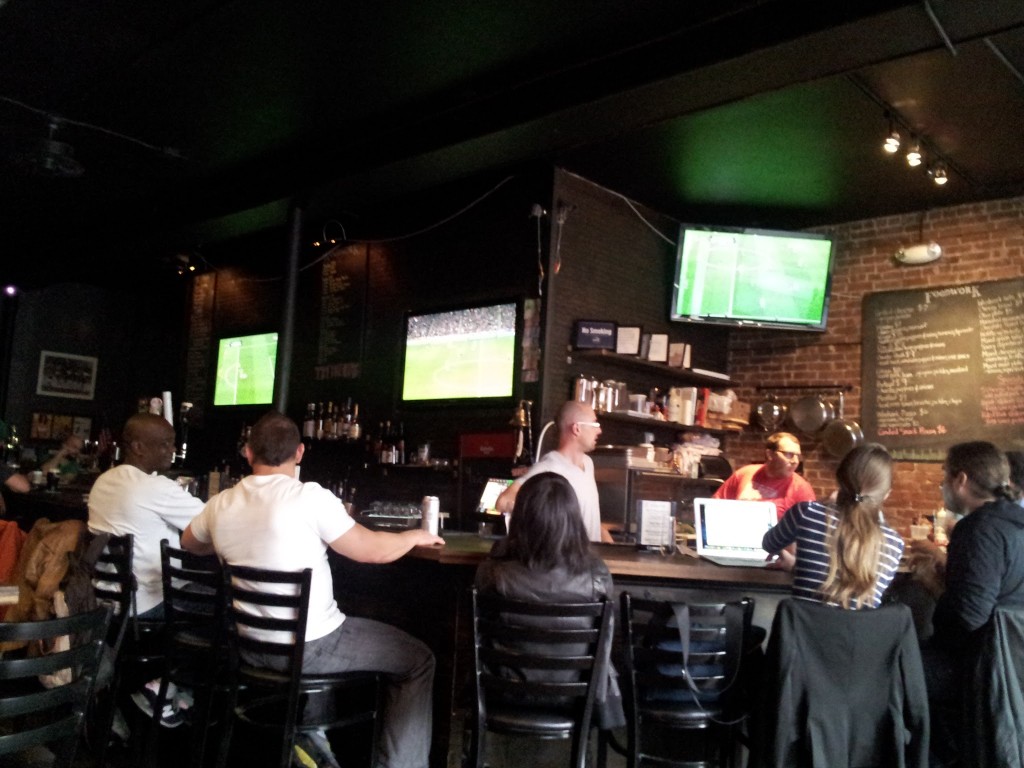Defending champions Bayern Munich have travelled to London to take on Arsenal at the Emirates, while emerging power Atlético Madrid take on waning power AC Milan.
main
Champions League
Champions League Power Ranking + Probability Distribution
Bookies? Who needs bookies? Here are our totally informal power rankings/chances of your team taking home the cup with the big ears.
Champions LeagueCommentaryPreviewSpain
UEFA Champions League MegaMix Round of 16 Preview (Part 1): Man City-Barcelona, Leverkusen-PSG, Arsenal-Bayern, Milan-Atlético
Set your DVRs, plan your late long lunches, etc. The Champions League is back. If you're a follower of European club football, you're excited as we are. If not, but you plan to watch the World Cup this summer, this is the competition you need to watch to get ready. Here are our previews of this week's four first leg matches, with a focus on which players to watch on each team (and a particular focus on players that will feature prominently at the World Cup this summer): Man City-Barcelona, Bayer Leverkusen-PSG, Arsenal-Bayern Munich and AC Milan-Atlético Madrid.
Champions LeagueCommentary
Two Days of Destruction! (Part Eins von Zwei)
The two epic Champions League semifinal ties did produce two memorable and perhaps historic 1st leg matches this week, but not in the way that any of us expected. One wordsmith needed only five of them to sum it up: “Two days of destruction. Unbelievable.”
Tuesday was Bayern Munich-Barcelona, Wednesday was Borussia Dortmund-Real Madrid. The Bavarians were favored in the first match, playing at home and in incredible form this entire season, while Barcelona have been wobbling for months. But surely no one predicted a Bayern’s 4-0 shellacking of Barça, nor Dortmund’s 4-1 decimation of Real Madrid the next day.
On Tuesday, Bayern dominated start to finish, playing with speed, power, and finesse. The first two goals came off corners–which Barcelona were conceding at an alarming rate, indicative of the fact that although Bayern predictably had less possession that Barcelona, their possession was much more potent. Bayern was especially dominant on the flanks, with Robben and Ribery winning their battles with Dani Alves and Jordi Alba–pinning the latter two back for the most part, thus robbing Barcelona of their width in attack. Coach Larry summed up Bayern’s masterclass thusly:
Bayern executed their plan perfectly. Press Barça to force wide at the back, and re-press from all directions if the ball reached attacking areas.
Their sheer relentless effort and physicality won them the match. Not ever have I seen a team play at that pace for an entire match, though perhaps Bayern took a bit of a break for about 15 mins after the 2nd goal.
Of course, they needed the right envirionment allowed by the referee to do so. Plus, the two goals (Gomez offsides on the 2nd, Muller’s pick to set Robben free for the 3rd) they benefitted from bad ref decisions are what ended the tie.
I’m hard pressed to think of a worthwhile contribution by any of Barca’s front players. They had practically zero attempts on the goal, and the only couple of serious chances fell to Bartra.
Much much more tactical analysis from ZonalMarking on his site, as well as in a Guardian column highlighting Spanish deep-lying midfielder Javi Martinez as a key player in the match. Martinez is the starred previously for Athletic Bilbao, and then controversially made the big money move to Bayern over the summer–a move that might have been to Barcelona, who wanted him badly, and could have had him had the Catalans been willing to show the Basques the money.
Excerpt from the Javi Martinez column:
Bayern’s key tactical weapon was Javi Martínez, whose primary job was to track Andrés Iniesta’s runs – but he played a much broader role, imposing his physicality on the game with a dominant midfield performance. He repeatedly dispossessed Barcelona’s midfielders and also stormed forward into attack unexpectedly to drive Bayern up the pitch – he demonstrated precisely why Barcelona were interested in signing him from Athletic Bilbao last summer. This was a landmark performance from the Spanish holding midfielder – he has been widely regarded as a success in his debut campaign at Bayern but here he outperformed his more illustrious international team-mates with an all-round performance Busquets, Xavi and Iniesta might not be capable of.
By Wednesday morning there were of course uncountably many “end of an era” op-eds littering sports pages across Europe. If you’re only going to read one, it might as well be Sid Lowe’s “changing of the guard” piece:
And so this Barcelona generation comes full circle. That, at least, is the conclusion many were drawing immediately after this astonishing defeat. For many this represented the end of an era. That conclusion is premature but there was a kind of seductive logic to it. Few teams have been as aware of their place in the club’s history as this one and, even at their lowest moment, there was a certain symbolism, a symmetry.
Barcelona equalled their worst ever European result, their worst result for well over a decade. They also equalled the result that Barcelona fans will never forget, from 18 May 1994. The Dream Team were the model that Pep Guardiola said all subsequent Barcelona teams sought to emulate. This generation had done so in just about every way; perhaps all that was left was to do so in defeat too.
The Dream Team’s most famous victory, the one that defined them, was a 5-0 victory over Real Madrid; their most famous defeat, the one that brought it all crashing down, was the 4-0 hammering at the hands of Milan in the European Cup final in Athens. This generation’s single most famous victory, the one that Xavi Hernández cites as their best performance, was a 5-0 victory over Real Madrid; could this 4-0 defeat be the one that brings it all tumbling down?
Jonathan Wilson had built up the expectations, writing pregame that this “meeting of the two great sides of the age” had the potential to be an era-defining encounter. And perhaps it was–after the match JW pivoted towards speculating whether now sides all over Europe (the world?) would try to emulate Bayern instead of Barcelona. His lede contains a nice capsule history the eras of European champions:
The sun has set on the age of Barcelona and dawn has broken on the bright new age of Bayern Munich. Bayern’s demolition of Barça last night certainly had the sense of a game that changed the order of things – even in advance it felt like an era-defining game. It crystallised the sense that Barça are not quite what they were, a weary shadow of the team that won the Champions League in 2011, and that Bayern are rising, inspired by a crop of fine young players and German economic might.
As such the victory – aside for all but ensuring Bayern’s place in theChampions League final – has largely symbolic value. That was the moment, historians will say (assuming things pan out as we think they will) when the crown was passed on. Except, of course, that it’s not that simple, not least because eras are no longer so easy to define as they used to be. Look down the list of European Cup winners and there are reasonably clear divisions: the age of Real Madrid separated from the era of Catenaccio and Milanese domination by the Benfica interregnum, the total footballing time of Ajax and Bayern Munich, then the period of English domination that was ended at Heysel. That led to a period of flux before the arrival of Arrigo Sacchi’s Milan.
We’ll have to push a recap of Dortmund-Madrid into a separate post, to be published in the near future. Not only is this post too long already, but we haven’t even finished watching that match.
(Via a Guardian gallery of Spanish newspaper coverage of the historic defeat:
Champions LeagueEuropePreview
Clash of the Titans II: Real Madrid vs Borussia Dortmund
Well, yesterday’s clash of the titans turned out to be bloodbath. Bayern was favored, but no one saw a 4-0 demolition of Barcelona coming. More on that later in the week..
In the meantime, we’re looking forward to the 2nd semfinal 1st leg later today, another Bundesliga club hosting a Spanish club, with Real Madrid at Borussia Dortmund. A somewhat unusual feature of this matchup is that these squads are quite familiar with each other, as they finished 1-2 in the Goroup of Death in the group stage in the fall. Dortmund unexpectedly finished top of the group, drawing 2-2 at the Bernabeu (a game they probably should have won), and beating (and outclassing) Madrid 2-1 at home.
As yesterday, here’s a few preview links to get you ready for today’s big match:
As usual, if you have time to read only one thing, read Zonal Marking’s tactical preview. Two players to watch, as ZM highlights, are the two opposing young German umlauted star creative midfielders–Madrid’s Mesut Özil and Dortmund’s Mario Götze:
Götze v Özil
Maybe the most interesting battle, however, will be between the number tens. Last year Mesut Özil was outclassed by Toni Kroos at the semi-final stage, because Kroos was more comfortable dropping into deeper positions to allow Bayern to dominate.
They won’t literally be duelling on the pitch, of course – both will be fielded as central attacking playmakers, closely supporting their side’s main striker – but both will be charged with providing creativity from between the lines and leading quick counter-attacks.
Perhaps the style of this contest will suit Özil, but if the match becomes a patient battle of possession, Götze has the opportunity to dominate. Although a playmaker who thrives on space between the lines, and loves dribbling with the ball at speed, he’s also intelligent with his positioning, happy to drop deep into midfield to find space. In the previous round, with Manuel Pellegrini ordering Malaga to sit deep in two banks of four, Götze often retreated to extremely deep positions, behind Dortmund’s holding midfielders, to collect the ball and start attacks. You won’t find Özil doing that.
Götze’s role this week will be fascinating. He unwittingly finds himself at the centre of a very modern tactical debate — next season at Bayern Munich he’s likely to become a false nine, but in this Champions League semifinal tie, will he play as an Özil, or play as a Kroos?
The big surprising news of the week alluded to above is that Götze will be moving to Dortmund’s hated rivals Bayern Munich–the timing of which news that Dortmund’s star manager Jurgen Klopp is understandably unhappy about.
From a profile of Klopp, who, as much as any player, is the public face of this team: “Dortmund want to play football people will remember, says Jürgen Klopp: Talismanic manager has taken the club from uber mediocrity to a:
Dortmund pounced on Klopp when others hesitated. The manager was delighted to join a “football city” (although he later revealed he thought the club’s first contract offer “was a mistake” as it was less than he had earned at Mainz) and started rebuilding the squad. “I have the feeling that I will be able to work with the full support of the club here,” he said in August 2008. “Life is too short to worry about things anyway. I am 0.0% naive. I know how it works by a business. If you don’t do your job properly you lose your job.”
There has not been any chance of Klopp losing his job at Dortmund. Borussia finished sixth in his first season in charge and then fifth in 2010, having sold the club’s two top scorers, Mladen Petric and Alex Frei, in the process. The following season Dortmund won the Bundesliga, seven points ahead of Leverkusen, while still operating on a much smaller budget than most of their rivals. Dortmund had gone from the brink of bankruptcy to winning the league in six years, Kloppo style.
Mats Hummels, a Bayern Munich reject, cost €4m, Robert Lewandowski €4.5m, Neven Subotic likewise, Shinji Kagawa a measly €350,000. Lukas Piszczek arrived on a free while his compatriot Jakub Blaszczykowski joined for a reported fee of €3m. Nuri Sahin, Marcel Schmelzer, Götze and Kevin Grosskreutz all came through the ranks. Since that first league title win, Ilkay Gündogan has signed from Nürnberg for €4m and Marco Reus from Borussia Mönchengladbach for €17.1m.
No wonder Brendan Rodgers said recently that he wants to build Liverpool’s squad “the Dortmund way” (although the way Sahin, now back at Dortmund after a short-lived loan spell at Liverpool “thanked God” he was no longer playing for Rodgers suggests the man at Anfield has some way to go to match Klopp’s man-management skills).
But the Dortmund way is so much more than just scouting and bargain buys. Klopp has his own philosophy of what makes a squad competitive and it is one that sums up the ethos of the city they play in. “There are certain places where you have to conduct yourself and play football in a certain way, where you just can’t be pleased with staying back and hoofing the ball upfield,” he told the German football writer Uli Hesse last year. “There are certain places where, if you do that, people will say: ‘If that is the way you are going to play then I won’t go and watch you.’
“And Dortmund is one of those places. Here people demand that the team should play with the attributes that are closest to my heart: with a lot of feeling and with intensity until the very last minute. We want to play the kind of football people remember.”
Finally, one for the hipsters: SBNation with an essay on “Borussia Dortmund and hipsterdom“.
Champions LeagueEuropePreview
Champions League Semifinal Today: Clash of the Titans
It is upon us, a clash of the titans: Bayern Munich hosting Barcelona in the 1st leg of their Champions League semifinal tie. The German superclub and Bundesliga champions against the Catalan superclub and La Liga champions-elect. Both of them 4-time European champions (Bayern in 1974, 1975, 1976, & 2001, Barcelona in 1992, 2006, 2009, & 2011). The two great sides of our era, perhaps–with a man who won’t even take part today sitting at the fulcrum between them.
Here is Jonathan Wilson today in the Guardian:
Football too often denies us the truly epic tie, the meeting of the two great sides of the age, and it’s perhaps that more than anything else that makes Tuesday night’s Champions League semi-final between Bayern Munich and Barcelona so enticing.
This has the sense of an era-defining encounter: Barcelona, who have dominated Europe for the past half-decade (it’s a remarkable fact that, even in their sixth successive semi-final, it still feels as though they have not quite achieved what they might have done in the Champions League) and Bayern, who could be the dominant force of the years to come: Pep past against Pep future in a Pep-less present that could mark the transition from one generation to the next. Or could, conceivably, were Barcelona to win convincingly, assert Barça’s hegemony and perhaps even the growth of a new dynasty under Tito Vilanova.
Staying with football’s New Seriousnessists, Zonal Marking’s tactical preview:
Even before Pep Guardiola announced he was moving to Munich in the summer, Bayern had increasingly become based around ball retention. Their 2009/10 side, which reached the final and is still similar to the current starting XI, mixed good ball retention with a counter-attacking threat, but their progress to the final that season was more based around the latter. From the first game of the following season, the 1-0 win over Wolfsburg, their possession play was much more pronounced – it’s not unreasonable to suggest that Germany’s 1-0 defeat to Spain that summer in South Africa, a clear demonstration of proactive football getting the better of reactive football, contributed, considering how many Bayern players played for Germany, and how many Barcelona players played for Spain. Louis van Gaal was also clearly a major factor.
Bayern have been heavily influenced by Barcelona – now, they have the chance to defeat them to signify a power shift before Guardiola arrives.
And from the School of Unseriousness, the genius of Barney Ronay shines its light on the historical sweep of this Spain vs Germany set of semifinal ties:
It is tempting to read a great deal into the swaggeringly four-square German-Spanish dominance of this season’s Champions League semi-finals. Football loves a sweeping narrative and in Bayern v Barça and Dortmund v Real there is a sense of certain shared sporting values that go beyond mere geography, a butterfly print of matching elites from which the committed Rorschach theorist might draw all manner of overheated conclusions. But if the significance of such moments of dominance can often be overstated – exhibit one: the unstoppable rise of the Premier League (sell-by date 2011) – there is still a starkness to this semi-final lineup, a sense of a greater historical ascent in play. Something is happening here. But what, exactly?
Perhaps the most striking element of this drift towards a Germano-Iberian duopoly is the feeling not of opposed and contrasting superpowers, but of convergence and consensus, of a fraternal similarity. The dawning of the age of Iberia may have been upon us for some time, but in the Bayern supremacy it finds an answering echo: if Germany and Spain are streets ahead when it comes to player development and tactical coherence, they appear to have skipped off around the corner more or less hand-in-hand.
Read the links in the next hour–and enjoy the match!
Champions LeagueNews
This Week’s Champions League Results: Dortmund-Shakhtar, PSG-Valencia, Juve-Celtic
The week’s Champions League oxygen was mostly sucked up by Tuesday’s memorable and controversial Manchester United 1-2 Real Madrid match, but with three other second legs also in the books, we’ve now got four of eight quarterfinal spots set: Madrid, Borussia Dortmund, PSG, and Juventus. Next week’s remaining 2nd legs matches will determine the other four: Barcelona-Milan & Schalke-Galatasaray (Tues); Bayern-Arsenal & Málaga-Porto (Wed).
Of this week’s three “lesser” ties, only PSG-Valencia was close. Dortmund convincingly beat Shakhtar 3-0 at home yesterday, to win 5-2 on aggregate, while Juve won 2-0 at home to post a manita on Celtic.
But while the Qatari-funded Parisians had won the 1st leg at the Mestalla a couple weeks ago 2-1, they gave up the goal very late, and also Zlatan saw red in the closing minutes, leaving the door slightly ajar for the Valencia. And indeed, they were down 1-0 at home today at 55′, so that a 2nd Valencia goal would have given them the tie–but then Lavezzi scored for PSG 10 minutes later. It ended 1-1, so PSG go through 3-2 on agg.
As the featured image above show, Lavezzi was excited after scoring. Also shows that the guy belongs in gritty Napoli, not refined Paris! But he did come through with a goal in each leg of this tie. His goal at the Mestalla was created by PSG’s new Brazilian kid Lucas [Rodrigues] Moura da Silva, who quickly displaced Oscar as the most highly hyped young Brazilian not still playing in Brazil.
Here’s Coach Larry with some notes on PSG-Valencia:
I did watch PSG-Val. Snoozer. In the first half, PSG waited for a chance to counter-attack, Valencia didn’t really engage at all. There were only two 1/8 chances both for PSG. Moura played more inside and barely touched the ball. Now keep in mind, Valencia needed 2 goals to have a chance, and one from PSG kills the tie. On one transition, Valencia had a chance to advance quickly, and it took three passes before they advanced a 5th player into PSG’s half. Not attacking third, HALF. And PSG had 7 behind the ball. Obviously, the game turned a little better once the miracle blast from Jonas (Brazilian) went in, that only requiring a very poor square pass from Van Der Wiel and no attempt from Matuidi to head clear. Sadly, this “turn better” wasn’t much more exciting. Valencia controlled the edges and the positional play, but even on their corners, looked no danger on winning crosses as Motta and Alex and whoever else plays in the back, easily won the headers. And the Valencia defense struggled to cleanly win the balls cleared, frittering away the time they needed trying to win balls against 1 or 2 PSG players. One of those times, they did not even win it eventually, gifting the Lavezzi goal defending 4 against 2.
oh, and just to be clear here’s the tweet from Iain MacIntosh:
Just did the washing up. Needed some excitement in my life after that PSG – Valencia game. Boy, did it deliver.
— Iain Macintosh (@iainmacintosh) March 6, 2013
Larry’s notes prompted Edinho to chime in with his own observations:
Watched a bit of the PSG game, mostly because I wanted to catch a sight of Becks and Posh, to see what do he may have come up with for his Parisian phase. Thought Becks was going to come on as he was warming up, but then Ancoletti did to him what Mourinho did to Benzema, explaining later “To replace Motta I had to choose between Gameiro and Beckham and I thought he could bring more attacking energy.” Wonder what Becks thought of being described as having ‘less attacking energy’? He did pace on the sideline in was described elsewhere as an “endless warmup routine”.. Perhaps the PSG contract was for him to do just that – excite les femmes Parisiennes? Aside from this, I was curious about PSG’s level of play against a top Liga side, and was impressed that, after they had been woken up out of the ridiculous idea of playing negatively to hold a single goal lead, their players had pace and control when they turned it on to outmaneuver Valencia, even without man-mountain Ibrahimovic. If Fergie decides to cling on to his job, Mourinho could do worse than cosying up with Becks for a possible 4th Champions league title from a 4th country.
Oui, oui! Becks is trés excitant! Can’t wait to see him warming up in the quarterfinals, as “his” PSG moves towards potential CL glory.
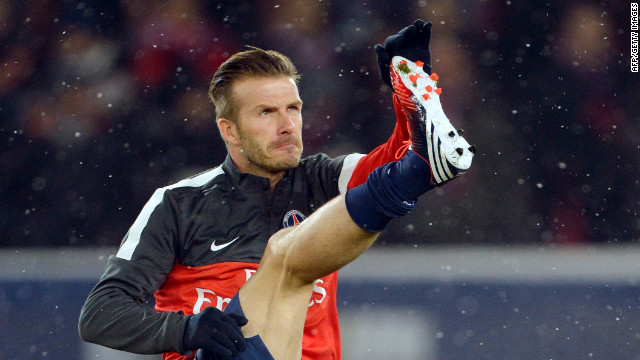
Champions League
Shakhtar’s Brazilian Carnival Shocks Chelsea
It was quite an exciting first half to Champions League Matchday 3 yesterday. We watched at Woodwork again, which was nicely mellow, with 3 different matches on their 3 screens–from left to right: Shakhtar-Chelsea, Juve-Nordaelland, and Barcelona-Celtic, with the house sound system tuned to the Barça match for the first half, and the Juve match for the 2nd. (One Manchester United fan showed up too late to claim a TV, and so was reduced to streaming the match against Braga on his laptop.)
For a while it looked like we were headed towards upsets at the Camp Nou, at Old Trafford, and at Nordsjælland. But while the “big” club escaped in each of those matches (although Juve only with a point, thanks to a fantastic late goal by Vucinic), our attention was primarily on the Shakhtar-Chelsea match, and out in far eastern Ukraine the upset held. As the Mirror cheekily put it, it was “A Shaktar the system: Champions Chelsea outclassed and outplayed in Donetsk.”
And although yesterday was good, today just might be better. Of the eight remaining Matchday 3 fixtures, the ones to watch, IOHO, are Arsenal-Schalke, Málaga-Milan, and of course the two matches in the Group of Death—Ajax-Man City and Borussia Dortmund-Real Madrid this time around:
